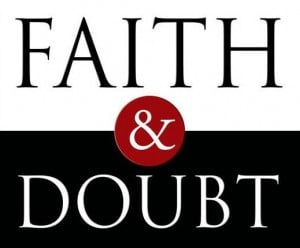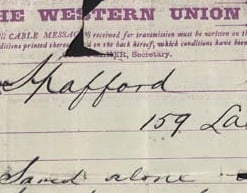
I’ve come to a seemingly contradictory conclusion: there is no faith without doubt.
You cannot prove either that God exists, or that a Supreme Intelligence does not exist. Many have tried the former: Christians resorting to intellect and even mathematics to argue probability of intelligent design, and then declaring their case “proven.”
It isn’t, and cannot be proven. Probability, yes; absolute assurance, no.
But neither can the atheistic counter argument, the flat statement that there is no God, be proven. Period. At best, the only intellectually, purely secular logical stance is agnosticism: the existence of God is unknowable by any form of science or logic or argument.
But most people suspect, many strongly enough to declare it as truth, that our reality extends far beyond our senses and the limited, finite ability of our human capacity for reason. That there is something that is transcendent in existence and the cosmos. That there are, as Shakespeare wrote, “. . . more things in heaven and earth . . . than are dreamt of in your philosophy.”
I wonder if 17th Century French philosopher Blaise Pascal had read that passage from Hamlet? He became an example of what some call an “agnostic theist.” Consider the so-called “Pascal’s Wager”:
“Even under the assumption that God’s existence is unlikely, the potential benefits of believing are so vast as to make betting on theism rational.”
Skeptics argue Pascal’s approach was flawed for its ultimate irrationality. But the whole point of “faith” is that it resides in a realm of thought and conviction beyond our perceptions of what we can see, hear, smell, taste, touch or submit to an equation.
Pascal was not ignorant of the conundrum. He also said, “In faith there is enough light for those who want to believe and enough shadows to blind those who don’t. “
Paul the Apostle put it this way: “Now faith is the substance of things hoped for, the evidence of things not seen.” (Hebrews 11:1 KJV)
“Faith is not belief without proof, but trust without reservations.” –Elton Trueblood, 20th Century American author and theologian
One of my favorites? This observation from 19th Century Spanish writer and philosopher Miguel de Unamuno: “Faith which does not doubt is dead faith.”
And 19th Century Russian novelist Fyodor Dostoyevsky mused: “It is not as a child that I believe and confess Jesus Christ. My hosanna is born of a furnace of doubt.”
I was reminded of the intersections of faith and doubt Sunday when an associate pastor sermonized about a hymn I have always found especially touching, “It Is Well With My Soul.”
Horatio Spafford wrote the hymn after a Job-like period where, between 1871 and 1873, he lost his business to the Great Chicago Fire, followed by the death of his 4-year-old son, and the loss of his remaining four daughters to shipwreck.

His wife was the sole survivor, breaking the news to him in a brief, heart-rending telegram: “Saved alone. What shall I do.”
Spafford set sail to reunite with his wife in grief, and he wrote the immortal words to his hymn as his shipped passed near where his girls had drowned.
It concludes: “And Lord, haste the day when my faith shall be sight, The clouds be rolled back as a scroll; The trump shall resound, and the Lord shall descend, Even so, it is well with my soul.”
That’s faith. To me, it always boils down to another word we humans have such trouble with: Trust.

